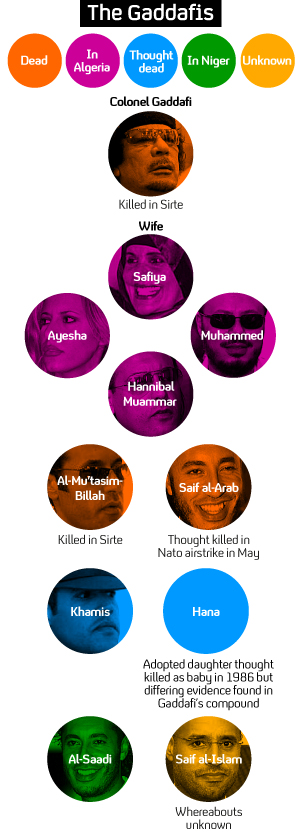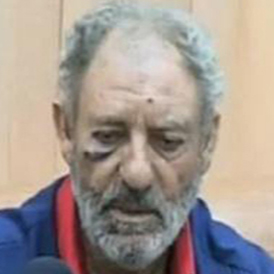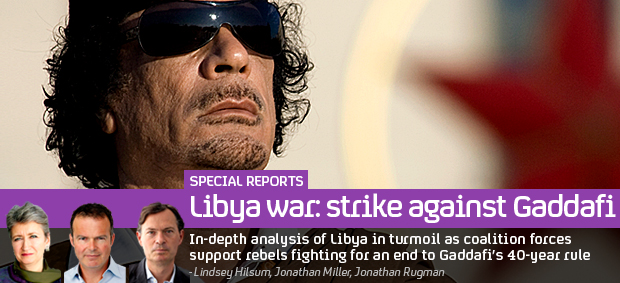‘Mutassim was in charge not Gaddafi’, says bodyguard
Gaddafi’s bodyguard claims that the former dictator’s son, Mutassim, was “in charge of eveything” from the start of the war, as questions emerge about how the Colonel was killed.
The bloodied bodies of Colonel Gaddafi and Mutassim, 36, were stripped and placed on slates then filmed on mobile phones; the footage now being broadcast across the world.
Accompanying Gaddafi in the car was Mansour Dao, the former commander of Libya’s Revolutionary Guards and the colonel’s cousin, who has appeared on Arabic television – dishevelled looking, and with a black eye – hours after his capture on Wednesday.
He has given a fascinating insight into Gaddafi’s last days and and his desperate movements in the last two months.
He also claims that it was Mutassim, not his father, who was running the show.
“Gaddafi was not running the battle, his son Mutassim was… As I told you, Mutassim was running the battle and not Gaddafi, and he was the decision maker about any move,” he said.
Until recently, Mutassim, Gaddafi’s fourth son and the former national security adviser, has received little attention from the world’s press, due to his perceived lesser status in the regime.
Gaddafi himself, his second son, the western-educated Saif-al-Islam, military man Khamis and al-Senussi had been thought to be masterminding what started as a crackdown on protests in February and became a full-scale war.
But Mutassim, according to Dao, “was commanding everything from the start.”

Gaddafi’s last movements
Dao’s account of his last few minutes in the company of Gaddafi also appears to cast doubt on suggestions that their convoy was hit but Nato-led planes and drones.
It had been thought that a US drone and French planes had struck the convoy, including the vehicle that Gaddafi and Dao had been travelling in.
Nato said its aircraft struck 11 vehicles in an armoured convoy speeding out of Sirte.
“These armed vehicles were leaving Sirte at high speed and were attempting to force their way around the outskirts of the city,” a Nato statement read.
“The vehicles were carrying a substantial amount of weapons and ammunition posing a significant threat to the local civilian population. The convoy was engaged by a Nato aircraft to reduce the threat.”
The statement said that initially, only one vehicle was destroyed, which disrupted the convoy and resulted in many vehicles dispersing and changing direction.
“After the disruption, a group of approximately 20 vehicles continued at great speed to proceed in a southerly direction, due west of Sirte, and continuing to pose a significant threat.
“Nato engaged these vehicles with another air asset. The post-strike assessment revealed that approximately 10 pro-Gaddafi vehicles were destroyed or damaged.”
But Dao (pictured) described no aerial attack whatsoever, and instead talked about “heavy, heavy gunfire from the rebels, all around, they had us circled.”

Gaddafi’s cousin added that their convoy was not escaping from Sirte, as has been widely reported, but rather was heading for the very village where he was born in the Jarif Valley near Sirte: Jahannam, “hell” in Arabic.
“Gaddafi did not run away, and he did not want to escape,” Dao said.
“We left the area (we were staying) towards Jarif, where he comes from. The rebels surrounded all the neighbourhood, so we had heavy clashes with them and tried to escape towards Jarif and break off the siege.
“After that the rebels surrounded us outside the area and prevented us from reaching the road to Jarif.
“They launched heavy raids on us which led to the destruction of the cars and the death of many individuals who were with us.
“After that we came out of the cars and split into several groups and we walked on foot, and I was with Gaddafi’s group that includes Abu Bakr Yunis and his sons and several volunteers and soldiers.
“I do not know what happened in the final moments, because I was unconscious after I was hit on my back.”
Dao said that until Thursday, Gaddafi had been moving location every four days, staying in different apartments in different towns.
At the end of the interview, Dao repeatedly apologised for his actions during the war and begged viewers’ forgiveness.
